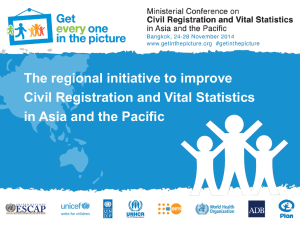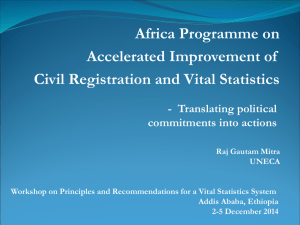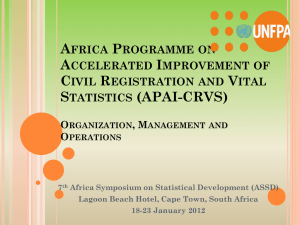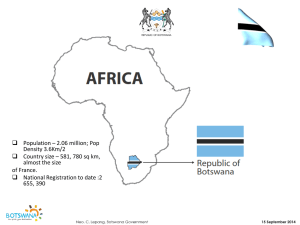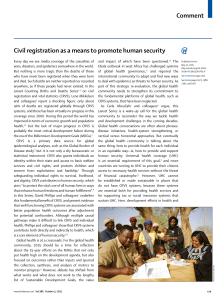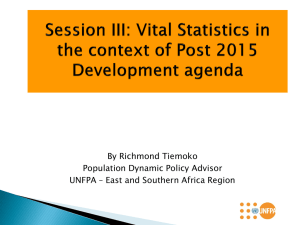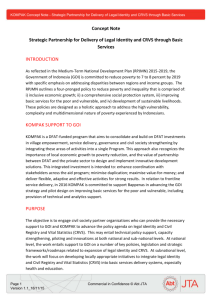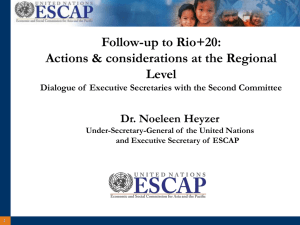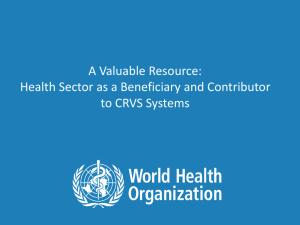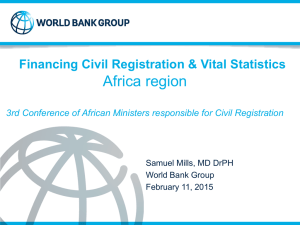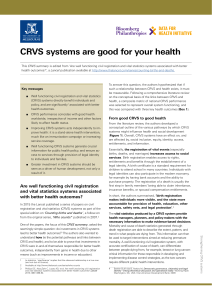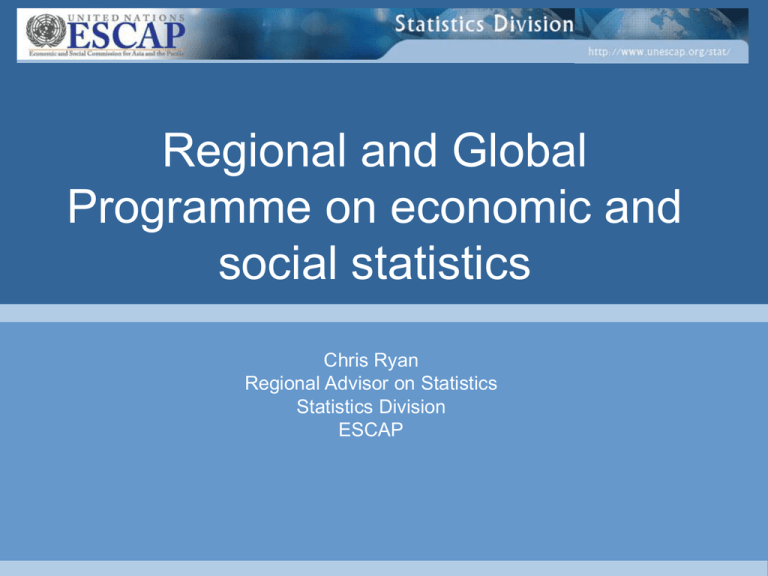
Regional and Global
Programme on economic and
social statistics
Chris Ryan
Regional Advisor on Statistics
Statistics Division
ESCAP
Presentation Content
• Regional initiatives ESCAP Statistics Division
are involved in:
– What they key ones are
– Where they are at currently
– What involvement have ASEAN members had
• Benefits of involvement to ASEAN members
• How may these initiatives be addressed in the
ACSS Strategic Plan 2016-2020?
1
1
1. Core set of population and social statistics for Asia-Pacific
Background
• Endorsed in 2010 at the 2nd session of the Committee on
Statistics
• Established a Technical Advisory Group (TAG) on Population
and Social Statistics
– Provide a strategic direction
– Provide methodological guidelines
• TAG has developed a core set comprising 11 domains:
–
–
–
–
–
–
Population (11)
Health (7)
Income, Wealth & Exp (5)
Employment (10)
Education & Training (9)
Housing & Infrastructure (7)
- Information & Communication (3)
- Crime & Justice (7)
- Family & Community (8)
- Culture & Leisure (4)
- Governance (7)
2
2
1. Core set of population and social statistics for Asia- Pacific
•
Core set based on some of the following principles
–
–
–
–
•
Serve as a benchmark for capturing basic needs for policy making
Not considered to be an exhaustive list – but considered most essential
By agreeing with the core set:
• member States not committed to deliver
• use as a regional guideline to improve national capacity
Core set is not prescriptive – countries can add statistics
Project still in its early days
–
Aim is for member states to be capable of producing the core set by 2020, as per the goal of the
Committee
•
TAG and the Secretariat currently working on a “Regional Programme” to ensure
countries have the capacity to develop the core set which will be presented to
the Committee in December 2014
•
ASEAN members involved in the TAG include Philippines, Indonesia and
Singapore
–
Philippines involved in a pilot study to investigate gaps in their core set
3
3
2. Regional Strategic Plan for the Improvement of Civil
Registration and Vital Statistics (CRVS)
Background
• In May 2011, ESCAP adopted a resolution (67/11) on the
improvement of CRVS in Asia-Pacific
• In December 2012, the High-level Meeting (HLM) on the
Improvement of CRVS in Asia-Pacific reached consensus on the
Regional Strategic Plan
– Endorsed by the Committee on Statistics (3rd session)
• In May 2013, ESCAP adopted resolution (69/15) on
implementing the outcome of the HLM
– Supported the endorsement of the Regional Strategic Plan
– Requested a Ministerial meeting in 2014
– Establish a Regional Steering Group
•
Members include 2 from Philippines, 1 from Malaysia and Lao PDR
4
4
2. Regional Strategic Plan for the Improvement of Civil
Registration and Vital Statistics (CRVS)
Vision
All people in Asia-Pacific benefit from universal and responsive CRVS systems that
facilitate their rights, and support good governance, health and development
Recommendations:
1) 2015 – 2024 be declared the “CRVS decade”
2) Universal civil registration and high quality vital statistics be included in the post2015 development agenda
3) The 2014 Asian and Pacific intergovernmental ministerial meeting on CRVS
build on current momentum – committing to regional action framework
4) Resources need to be allocated to support the improvement of CRVS systems
5) An accountability and monitoring framework be developed
5
5
2. Regional Strategic Plan for the Improvement of Civil
Registration and Vital Statistics (CRVS)
Goals
Goal 1: Universal civil registration of births and deaths
Target EG: By 2024, at least ….% of births in the territory and jurisdiction in the given year are
registered
Goal 2: All individuals are provided with legal documentation of civil registration of births
and deaths as necessary to claim identity, civil status and ensuing rights
Target EG: By 2024, at least ….% of all births registered in the territory and jurisdiction are
accompanied with the issuance of an official birth certificate that includes, as a minimum, the
individual’s name, sex, date and place of birth, and name of parent(s) where known
Goal 3: Accurate, complete and timely vital statistics (including on causes of death) are
produced based on registration records and disseminated
Target EG: By …. (year), annual nationally representative statistics on births – disaggregated by
age of mother, sex of child, geographic area and administrative subdivision – are produced from
registration records or, alternatively, other valid administrative data sources
6
6
2. Regional Strategic Plan for the Improvement of Civil
Registration and Vital Statistics (CRVS)
Ministerial Meeting in November, 2014
• Bangkok on 24-28 November
• Objectives:
– Agreement on priorities for improving CRVS in Asia-Pacific
– Commitment to accelerate and focus the efforts of governments and
development partners to achieve universal and responsive CRVS systems
in all Asian and Pacific countries
• Expected Outcomes:
– A Ministerial Declaration on CRVS
– Endorsement of a monitored and time-based Regional Action Framework for
2015-2024 to support Ministerial Declaration with action areas and national
targets under the three goals
– Formalization of the CRVS Partnership of development partners in the AsiaPacific Region
• Co-organized by ESCAP, UNICEF, UNDP, UNHCR, UNFPA,
WHO, ADB and Plan International
7
7
3. Core set of economic statistics
Background
• ESCAP given mandate to develop a core set of indicators by the
Committee on Statistics at its 1st session (Feb 2009)
• Technical Advisory Group (TAG) established in August 2009
– Develop a Regional Programme for the development of
economic statistics
– ASEAN Secretariat and Indonesia involved
• The Regional Programme and core set were subject to
discussion between global, regional, sub-regional and national
partners:
– An Expert Group Meeting, Sept 2009
– A Workshop to Develop a Regional Programme for improving Economic
Statistics, Dec 2009
– TAG holding back-to-back meetings with both
8
8
3. Core set of economic statistics
Background (cont)
• Steering Group for the Regional Programme on Economic
Statistics (SGRPES) was endorsed by the Committee on
Statistics at it’s second meeting in Dec 2010
• Current members of SGRPES include Cambodia, Indonesia,
Lao, Malaysia, Philippines, Singapore and Vietnam (with ASEAN
Secretariat involvement)
• Capacity screening has been taking place since the
establishment of the SGRPES for most Member States in AsiaPacific
– 9 of the 10 ASEAN members participated in the screening
9
9
3. Core set of economic statistics (cont)
The core set addresses the following 7 domains:
1. Prices & Costs (7)
2. Demand & Output (10)
3. Income & Wealth (6)
4. Money & Banking (3)
5. Government (2)
6. Labour Market (2)
7. Natural Resources & the Environment (1)
• For each indicator within a domain, a recommended frequency
of reporting has been provided by the SGRPES
10
10
3. Core set of economic statistics (cont)
Important things to note about the work of the RPES:
• Member States are not obliged to produce the entire Core Set –
it shall be used as a reference for capacity development
• Three implementation phases
– Phase 1 (2013-2014): Capacity Screening, Fundraising &
Development of Eco Stats action plans
– Phase 2 (2015-2017): Accelerated regional and country level
implementation
– Phase 3 (2018-2020): Consolidating national and regional
efforts to achieve the programme effort
11
11
Benefits to ASEAN members
• Enables comparisons across a wider community
• Assists the provision of statistical capacity building
• Mobilize donor support by identifying opportunities for
greater return on investment
• Creates an environment where countries can share a
best practice
• Develop a range of concrete tools and actions that
will assist countries in developing their capacity
12
12
ESCAP would like to request that …..
the Strategic Plan for the Establishment of the ACSS, 2016-2020 makes
reference to these Regional Initiatives where applicable
Given that
The ASEAN community has been heavily involved in the Regional
Initiatives outlined in this presentation
+
A) Core sets for both Economic and Population/Social are guidelines for
2
Member States to follow – not prescriptive
B) Targets set by Member States for the CRVS are determined by the
Member State
+
Obvious benefits to ASEAN members by adopting these Regional
3
Initiatives
1
13
13

